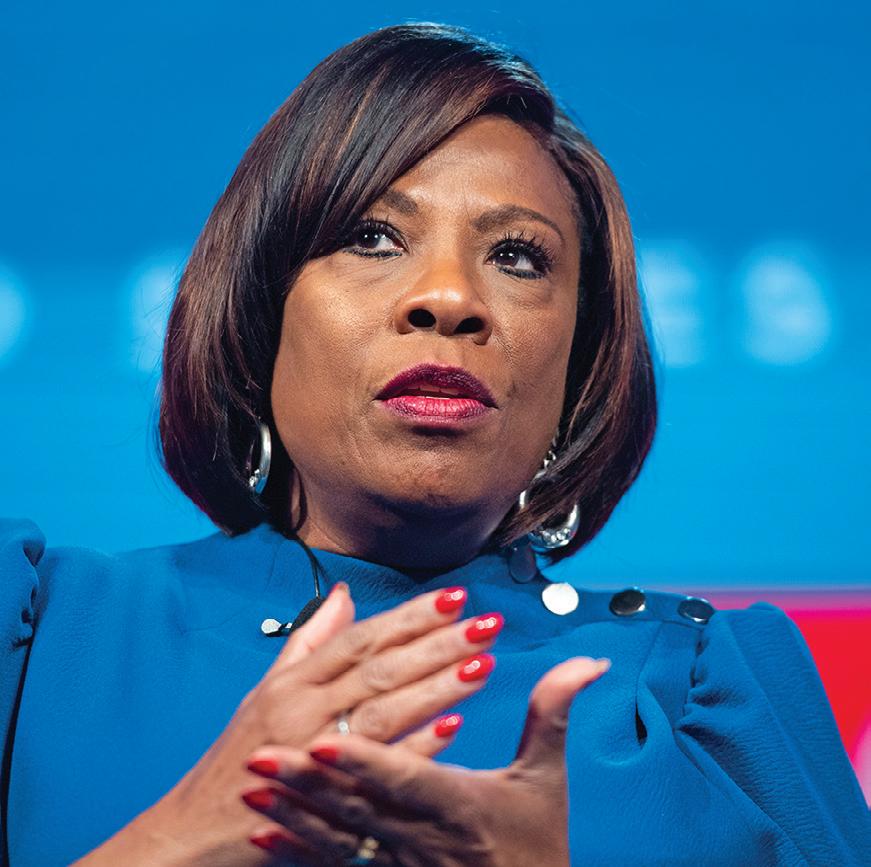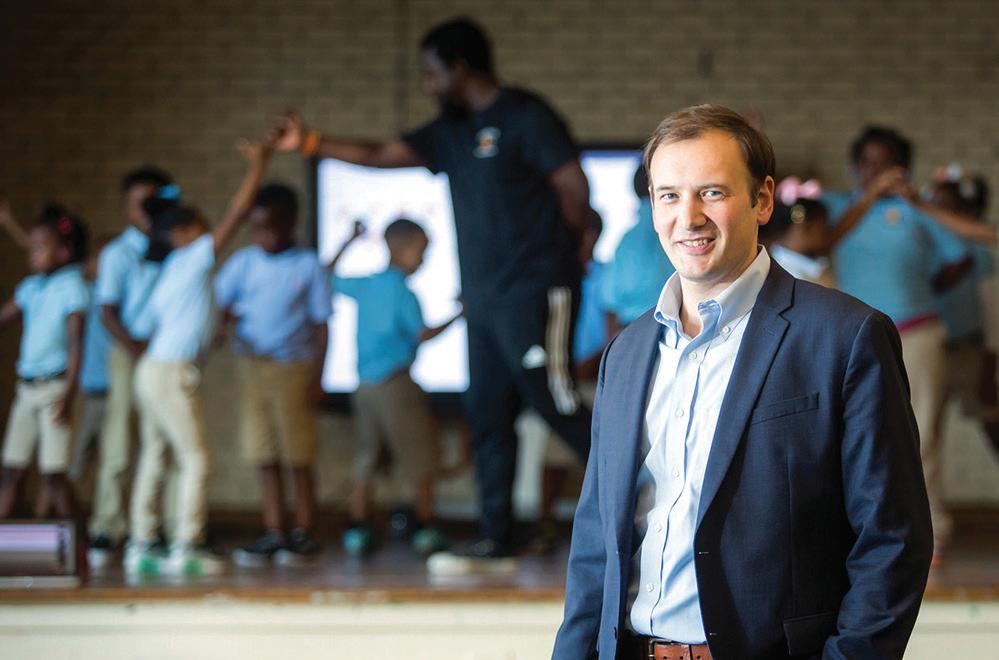
6 minute read
2022: 10 stories to remember
Stories to Remember
Economic uncertainty: Which way are we going?
When it came to the economy, there was a lot to question in 2022: Are we in a recession or not? Is high inflation transitory or the new normal? Is the Fed being too aggressive, or not aggressive enough, in raising interest rates? Is “quiet quitting” a thing, or a media invention?
But there was no question that the economy, to use a technical term, was
“extremely weird” all year. The Capital Region consistently added jobs this year, as the unemployment rate fell to record lows. Employers, however, struggled to fill open positions while workers saw rising prices gobble up their wage gains. Higher interest rates cooled off what had been a red-hot real estate market, though perhaps not as much as one might expect—at least on the commercial side. Economist Loren Scott thinks the national economy is headed for a mild recession next year, but he expects the Baton Rouge area will keep growing, which partly can be explained by the next story on our list.
ISTOCK
Industrial expectations building


While the price of natural gas rose this year, it’s still cheaper here than overseas, which is always good news for the local petrochemical sector. Ironically, the push for industrial decarbonization, long seen as a threat, may be driving the new expansion.
There are more than $20 billion in transitional energy projects either planned or being considered for the Capital Region. Most involve carbon capture and storage, which industry leaders consider a ripe opportunity thanks to south Louisiana’s favorable geology, though critics say the technology is ineffective and potentially dangerous.
COVID-19 is over, sort of
It’s hard to say whether the COVID-19 pandemic is actually over, since experts don’t necessarily agree on what constitutes a “pandemic,” let alone how to define when one begins or ends. And people are still getting COVID-19.
Signs of the pandemic and its aftershocks still could be seen and felt in Baton Rouge this year. Some continued to wear masks. Delivery apps remained popular, though slower growth has spurred some to expand their offerings. Supply chain snags lingered.
But talk of vaccine mandates has faded, even in the face of new variants. And life looks pretty much like it did before the novel coronavirus made its appearance.
ISTOCK
TIM MUELLER

St. George loses first round in court
Ad hoc Judge Martin Coady, filling in for the retired William Morvant, ruled that the voter-approved incorporation of St. George in southeast East Baton Rouge Parish is “unreasonable” under state law.
The St. George boundaries were not drawn to specifically exclude racial minorities and the incorporation petition “minimally satisfies” statutory requirements, Coady wrote in his decision. But he doubted incorporators’ ability to fully fund services and said the incorporation would harm the city of Baton Rouge.
The decision is being appealed, and may end up before the Louisiana Supreme Court. Incorporation supporters hope to follow in the footsteps of Central, which saw its incorporation denied by the trial court but ultimately prevailed.

RENDERING COURTESY CQ HOLDING COMPANY

Officials decided that the long-awaited new Mississippi River bridge crossing should be in Iberville Parish, which no doubt surprised some. Still, others are happy with any progress at all.
State lawmakers allocated a $300 million down payment for the project, which is expected to cost north of $2 billion, and approved a separate bill that dedicates up to $40 million annually. The final approval process and potential construction will take years, so it would be wrong to suggest we’re almost there, but if you squint, you can see signs of a new bridge on the horizon.
HOA VU
The over-under on gambling’s evolution
The Belle of Baton Rouge and Casino Rouge (now Hollywood Casino) gave downtown a spark during the 1990s, though they have been overshadowed for a decade by L’Auberge Casino & Hotel on the other side of town. Both started the process this year of moving inland, with upgrades said to be worth about $35 million and $80 million, respectively. Every pretend riverboat casino in the state likely will exercise their newfound right to shift onto dry land, which is meant to allow them to invest more in non-gambling amenities that grow revenue.
This year also saw the advent of legal sports betting. While it may help Louisiana’s gaming market keep up with competitors in other states, while siphoning off more money from states that don’t have it, the proliferation of sports betting (and the ubiquitous advertising) could lead to more problem gambling and the financial and social problems it brings.



Stormwater-gate
East Baton Rouge Mayor Sharon Weston Broome proposed creating a stormwater utility for reducing flood risk and improving water quality, funded by fees meant to raise about $36.5 million per year. She claimed the federal government was preventing local officials from disclosing conversations about the fee and potential federal mandates related to stormwater issues, which led some council members to think the city-parish was facing an imminent court order requiring immediate action. But the veil of secrecy turned out to be the administration’s own invention. The subterfuge not only derailed the stormwater utility conversation and led to at least two officials leaving city-parish government—though something similar to Broome’s proposal remains possible—it undermined trust between the two branches of government, which could haunt the rest of the mayor’s term and diminish her reelection chances.
TOM WILLIAMS/CQ ROLL CALL VIA AP IMAGES
New faces in high places
Turner Industries Executive Chair Roland Toups took a step back from the company’s daily operations and moved into more of an advisory role. His son Stephen Toups was named CEO.
Southern University’s board tapped Dennis Shields to be the next president and chancellor, succeeding Ray Belton, who announced his retirement in 2021. Shields had been the chancellor for the University of Wisconsin Platteville since 2010.
The Baton Rouge Area Foundation chose Chris Meyer (pictured), the founder and former CEO of New Schools for Baton Rouge, to replace John Davies as president and CEO. Meyer has overhauled the foundation’s staff to align with new goals officials say will be unveiled next year.
Tiger football’s unexpectedly quick turnaround
Ed Orgeron, who led LSU football to a national championship after the 2019 season, was fired after a rudderless two years for the program. Enter Brian Kelly, who Athletics Director Scott
Woodward lured from Notre Dame with a 10-year, $100 million contract and the opportunity to lead a program with a higher ceiling than the one he was leaving. While some questioned whether Kelly was a good cultural fit, he is on paper the most accomplished coach the program has ever hired. But even his most enthusiastic supporters likely have been surprised by how quickly he seemed to change the direction of the program in his first year, punctuated by a win over hated Alabama in an all-time classic game and a berth in the SEC Championship Game.
MARIE CONSTANTIN
Mary Bird Perkins moves on

Less than five months after its bitter breakup with Our Lady of the Lake Regional Medical Center, Mary Bird Perkins Cancer Center announced it had formed an agreement to share resources with Baton Rouge General’s Pennington Cancer Center. The agreement was the latest in a series of shake-ups in Baton Rouge’s health care market, more specifically in cancer care, and preceded leadership changes at Mary Bird Perkins and OLOL. Longtime Mary Bird Perkins CEO Todd Stevens stepped down to be replaced by Chief Operating Officer Jonas Fontenot, though Stevens was to remain with the organization in a business development role. Scott Wester, OLOL’s Baton Rouge market president, also stepped down from his position and later left OLOL entirely to lead a hospital system in Florida.






